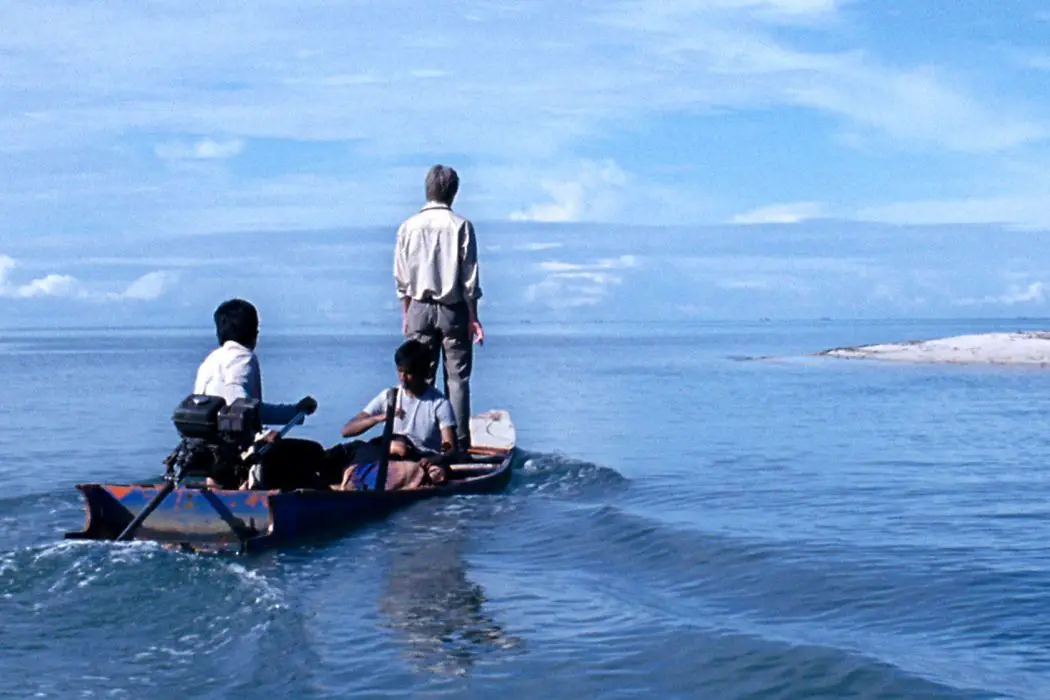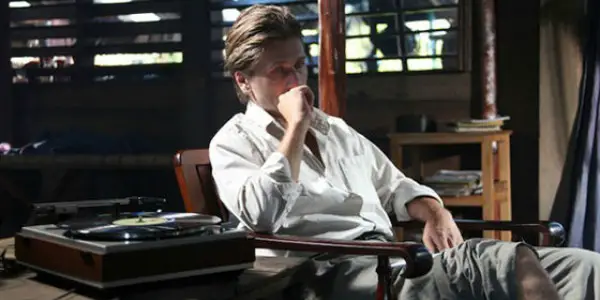ALMAYER’S FOLLY: A Study In Disappointment

Amyana Bartley is a screenwriter and producer. Her company, Queen…
Although Almayer’s Folly is my first descent into the work of Belgian filmmaker Chantel Akerman, it was the final narrative film she made before her death. Only loosely adapted on Joseph Conrad‘s book of the same name, the film explores an artistic journey into the depths of disillusion.
The Classic Tragic Character
Not having read the book, it’s hard to bring comparisons, but the elements of classically written characters are woven throughout the film. Shot in the wild jungles of Cambodia, Stanislas Merhar plays the bitter, anguished title character, Kaspar Almayer. Right from the start, Merhar’s performance is flawless. His internal suffering and irritability permeate every scene, and all the characters who interact with him.
In the book, Almayer is a young Dutch trader, but in the film, his occupation and purpose is less clear. The film allows the audience a short time to get to know his backstory through the dialogue between him and his rich patron, Lingard (Marc Barbe). Their relationship is also unclear, but we definitely get a sense of “father/son”.

Almayer is eager to impress Lingard, yet deep resentment lingers in his reactions to him. Almayer blames Lingard for his supposed bad life, wife and failures. He feels robbed of his promised opportunities for riches and his opportunity to fall in love. His marriage was arranged by Lingard to a Native woman, in return for the assurance of a good life and a gold mine, yet the mine is never found.
Lingard has come to fetch Almayer’s young, half caste daughter Nina, to give her a “white girl’s” education. Though a potentially lucrative opportunity for his daughter to have a better life, Almayer is torn in sending her. She is the only thing good in his life and the only one he loves. Lest his bad fortune fall upon her, he literally rips his daughter from the clutches of her unwilling mother (Sakhna Oum), and sends her off with Lingard to boarding school.
More Characterization Please
Almayer’s Folly spends quite a while flashing back and forward, which creates a bit of confusion. It spends more time on long, seemingly unnecessary shots of mundane action rather than the story. The film catches up to Nina, (Aurora Marion) now a young woman; she is still in school and quite unhappy about it. Since the film hasn’t followed any part of her journey or life up until then, it’s unclear why she’s so unhappy. She doesn’t seem to have any friends nor even a sense of direction.

It becomes clear, with dialogue throughout Almayer’s Folly, that Nina struggles her whole life being biracial. She is never fully accepted into either world. The issue with this is the fact that we don’t ever see any of those struggles. By mid-story, she is an unfeeling, zombified character, and since we haven’t taken any of her journey with her, it makes it hard to feel for her. She comes off as spoiled, ungrateful and downright cruel at times. I had no idea why her lifetime childhood friend, Dain (Zac Andrianasolo), ended up loving and marrying her.
In a final confrontation with her father, she spends a while talking about her lifetime of pain having been sent away. She flatly discusses why it’s all Almayer’s fault and how he ruined her life, but it’s still unclear why. Though Almayer was a deeply conflicted and a sometimes cruel character, I still got the sense that he desperately wanted to help his daughter succeed.
Instead, it becomes about yet another example of how Almayer has failed in his life and he ends up literally sinking into madness after Nina leaves him for good. Nina essentially becomes the father she has always hated.
Without much more, crucial characterization in the film, it’s nearly impossible to care about any of them. There is never any real resolution, nor change of the characters for the better.
In Summation
Overall, Almayer’s Folly has many good qualities. It is deeply artistic and clearly rooted in Ackerman‘s vision. There were seeming metaphors, like the filming of the dense jungles to represent the confusion and lost feelings of the characters. There are clear thematic elements touched upon like racism, failure and disappointment. The film shows how life disappointments change Almayer and Nina, though the whys never become clear, nor are we shown anything resembling a real story.
There is much disappointment here because of this. Almayer’s Folly had ample opportunity to build something, but ultimately it stayed locked inside of Ackerman‘s head, never to truly surface.
How did you feel after seeing Almayer’s Folly?
Almayer’s Folly will be released on DVD and VOD on November 22.
Does content like this matter to you?
Become a Member and support film journalism. Unlock access to all of Film Inquiry`s great articles. Join a community of like-minded readers who are passionate about cinema - get access to our private members Network, give back to independent filmmakers, and more.
Amyana Bartley is a screenwriter and producer. Her company, Queen B. Productions, supports filmmakers of all walks, interested in creating thought provoking, moving projects. As her company grows, she will create "real jobs" for any talented artist, in front of and behind the screen, who is passionate about making a difference using the art of film.













